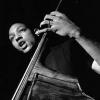-
Posts
6,019 -
Joined
-
Last visited
Content Type
Profiles
Forums
Events
Blogs
Everything posted by bertrand
-
Since COVID I have been playing it safe and only do Zoom orgies.
-
The compositions alluded to were not actually lost in a flood. They surfaced a few years ago, in the possession of family members: https://jazzleadsheets.com/composers/herbie-nichols.html
- 7 replies
-
- steve siegel
- herbie nichols
-
(and 2 more)
Tagged with:
-
Pianist Lafayette Gilchrist is performing a set of Nichols pieces with a Sextet this Saturday 2/18 in Frederick, MD. The second set will be his own compositions. My understanding is that the Nichols idea was suggested by Bill Shoemaker. Bertrand.
- 7 replies
-
- steve siegel
- herbie nichols
-
(and 2 more)
Tagged with:
-
The co-author of Endangered Species, Joe Vitarelli, never gets a mention.
-
Bob Dylan is a fan, apparently: Bob Dylan Talks Music, Religion and More in New Interview with 'The Wall Street Journal' (jambands.com)
-
I saw him at the Kennedy Center a few months ago. He was embarking on a mega worldwide tour. But yes, no studio work in a long time.
-
Thank you for joining in! I really enjoy your father's recordings!
-

F/S Frank Zappa and Mothers ‘71 Box Set
bertrand replied to greggery peccary's topic in Offering and Looking For...
You mean you get to hear him pushed off the stage? -
Such an awful story. He was much loved in the bay area.
-
One of the great unsung composers of jazz, and a trumpet player with a very original approach. Definitely one of my heroes.
-

Michael Cuscuna: We Need A Book!
bertrand replied to mjzee's topic in Jazz In Print - Periodicals, Books, Newspapers, etc...
AB retired a long time ago. Katja is moving back to Germany. I assume her job will be open soon. -

Michael Cuscuna: We Need A Book!
bertrand replied to mjzee's topic in Jazz In Print - Periodicals, Books, Newspapers, etc...
Dan may well be on the committee but I am sure he cannot say so. That does not guarantee he will know. I doubt Wayne Shorter knows how he became a Jazz Master exactly, just that someone nominated him. -

Michael Cuscuna: We Need A Book!
bertrand replied to mjzee's topic in Jazz In Print - Periodicals, Books, Newspapers, etc...
Well, I have never seen it described as such so I am just speculating. I never tried to ask. The current administrator is a friend of mine but she will not answer ANY questions about her job. I guess someone who is not friends with the administrator could write and make a claim that they have the right to know who is on the committee under a variation of the FIA. If someone chooses to do so, please do report back! I sure would like to know how things actually went down when the committee at the time decided to award it to the ENTIRE Marsalis clan. Only the Cassandra Wilson decision dwarfed this one in stupidity. One could have reasonably suspected that politics were involved, and in the USA politics are usually of a green hue, if you get my drift. PS: I would like to ask the committee why my Joe Chambers nomination has been ignored for EIGHT years now and counting. Someone suggested it was because he was grumpy. If that was the criteria, then how the fuck did Keith Jarrett get it? -

Michael Cuscuna: We Need A Book!
bertrand replied to mjzee's topic in Jazz In Print - Periodicals, Books, Newspapers, etc...
Yes, they take submissions from the public. But they don't want campaigns, so 50 of us on the board cannot all nominate him. Just one of us. Whether someone with pull like Mark has more chance than a nobody like me I am not sure, but I would not be surprised. There is a mystery committee which I suspect includes several previous honorees, such as HH. I could be wrong. -

Kenny Dorham's Blue Lament. 1961 unissued BN session.
bertrand replied to Hardbopjazz's topic in Discography
It looks like Blue Lament was not on the vinyl version, but that is the only bonus track as far as I can tell. -
These are all very interesting questions and I wish someone had really talked to him years ago about his life and career. There is an interview on YouTube which has its merits but is pretty shallow. He was already having memory lapses.
-

Kenny Dorham's Blue Lament. 1961 unissued BN session.
bertrand replied to Hardbopjazz's topic in Discography
One was recorded by the Messengers around the same time (Blue Ching). Blue Lament was recorded by Don Sickler years later. The other four are orphaned. -

Michael Cuscuna: We Need A Book!
bertrand replied to mjzee's topic in Jazz In Print - Periodicals, Books, Newspapers, etc...
Mark, have you nominated him? -

Kenny Dorham's Blue Lament. 1961 unissued BN session.
bertrand replied to Hardbopjazz's topic in Discography
The 1959 Blakey came out because Zev Feldman wanted it released and talked Don Was into it. Cuscuna's previous assessment seems to have been ignored, or maybe he changed his mind? If Zev pushes the KD date it might have a chance. But does he care about this one? -
I am curious about the set list.
-
That February 1950 Jam session with Clifford Brown and Hasaan (William Langford) must have been interesting.
-
There are out-takes from the film at the Schomberg Library. Not cataloged yet so there is still a possibility. I was looking for film of Booker Little...
_forumlogo.png.a607ef20a6e0c299ab2aa6443aa1f32e.png)
